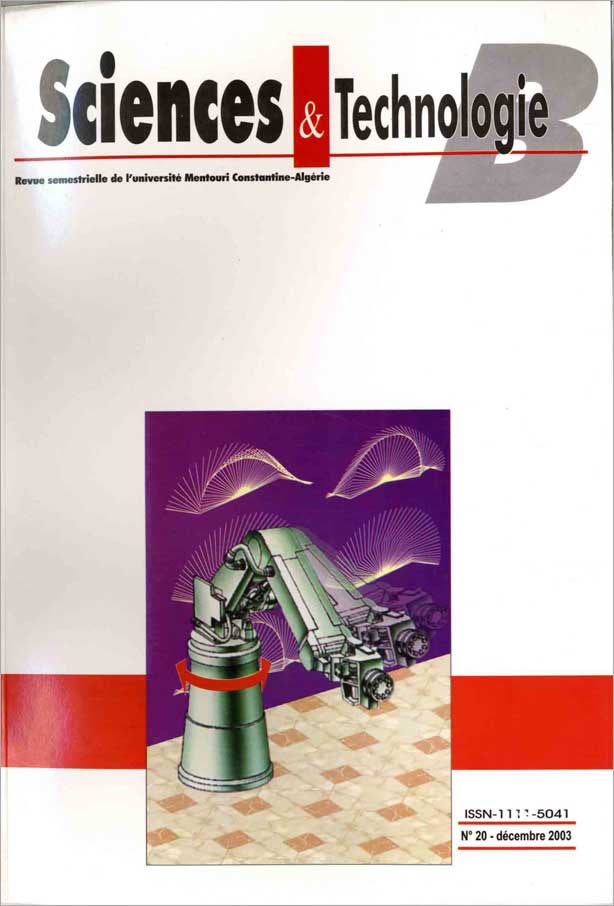EFFECT OF SPEED-GOVERNOR DEADBAND ON AGC ANALYSIS FOR TWO AREAS THERMAL-THERMAL SYSTEM
Keywords:
Automatic Generation Contro l, Governor Deadband effect, Integral and PI controllersAbstract
Thermal system is present in this paper. The governor deadband nonlinearity is included in the analysis. The model by just changing the controllers can be used to study the response with and without governor deadband. It is shown that the governor deadband nonlinearity has a destabilizing effect on the transient response with deterministic load disturbance. It is found that the proportional integral controller reduces the over shoot and leaves the setting time unchanged with respect to case when using integral controller. It is found that the value of B has an important influence on the transient behavior of AGC.References
- Hussein A. Kazem, K.A. Sattar, Ali A. Hussein,"Sample Data Automatic Generation Control Analysis", 2-International Conference on Role of Engineering Towards Environment, (Sustainable Development), Alexandria, Egypt, 12-15 December (1998), pp.447-461.
- Fukushima S., Sasaki T., Ihara S. and Leirbukt A.B., "Dynamic Anaysis of Power System Frequency Control", Cigre – 2000, System analysis and Techniques, Group 38-204, France (2000).
- Vournas C.D., Dialynas E.N., Hatziargyiou N., Machias A.V., Souflis J.L. and Papadias B.C., "A Flexible AGC Algorithm for the Hellenic Interconnected system", IEEE Trans., Pas- 89, (1989), pp.61-68.
- Kothari M.L., Satsangi P.S. and Nanda J., "Sampled data automatic generation control of interconnected reheat thermal systems considering generation rate constraints", IEEE Trans., VOL.PAS-100, N°5 (1981), pp.2334-2342.
- Tripathy S.C., Balasubramanian R. and Chandramohanan Nair P.S., "Effect of Superconducting Magnetic Energy Storage on Automatic Generation Control Considering Governor Deadband and Boiler Dynamics", IEEE Trans. on power systems, Vol.7, N°3, August (1992), pp.1266-1272.
- Hussein A. Kazem, K.A. Sattar, Ali A. Hussein, "Automatic Generation Control Using Continuous and Discrete Modes for Thermal-Hydro System Considering Governor Deadband Effect", 4th Regional Conference of Cigre Committees in Arab Countries, Tripoli, Great Jamahiriya, Vol.2, 19-21 feb. (2001), pp.259-270.
- Malik0.P., Ashok Kumar and Hope G.S., "A Load Frequency Control Algorithm Based on a Generalized Approach", IEEE Transaction on power Systems, Vol.3, N°2, May (1988).
- Das D., Nanda J., Kothari M.L. and Kothari D.P., "Automatic generation control of hydro thermal system with new area control error considering generation rate constraint", Electric Machines and power systems, Vol. 18, N°6, Nov-Dec. (1990), pp.461-471.
- Tripathy S.C., Bhatti T.S., Jha C.S., Malik O.P. and Hope G.S., "Sampled data Automatic Generation Control Analysis with Reheat Steam Turbine and Governor Deadband Effects", IEEE Power System Engineering Committee, (1984), pp.1045-1051.
- Lefebvre S. and Asber D., "Analysis and Improvement of Frequency Regulation", Cigre – 2000, System analysis and Techniques, Group 39-202, France (2000
Downloads
Published
How to Cite
Issue
Section
License
Les auteurs publiant dans cette revue acceptent les termes suivants :- Les auteurs détiennent le droit d'auteurs et accordent à la revue
le droit de première publication, avec l’ouvrage disponible simultanément [SPÉCIFIER LA PÉRIODE DE TEMPS] après publication, sous la licence Licence d’attribution Creative Commons qui permet à d'autres de partager l'ouvrage en en reconnaissant la paternité et la publication initiale dans cette revue. - Les auteurs peuvent conclure des ententes contractuelles additionnelles et séparées pour la diffusion non exclusive de la version imprimée de l'ouvrage par la revue (par ex., le dépôt institutionnel ou la publication dans un livre), accompagné d'une mention reconnaissant sa publication initiale dans cette revue.
- Les auteurs ont le droit et sont encouragés à publier leur ouvrage en ligne (par ex., dans un dépôt institutionnel ou sur le site Web d'une institution) avant et pendant le processus de soumission, car cela peut mener à des échanges fructueux ainsi qu'à un nombre plus important, plus rapidement, de références à l’ouvrage publié (Consulter The Effect of Open Access).

